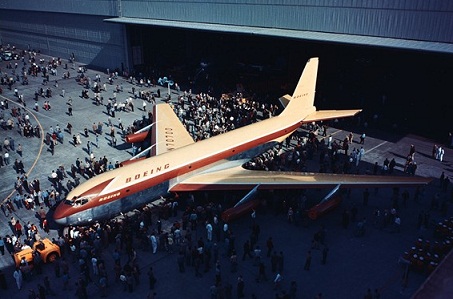Thursday, 10 February 2011
09:58 PM
There's endless debate about whether raising taxes is bad for business. Unlike, I guess, many pundits and bloggers, I don't have the economic chops to get into that discussion.
However, I did recently run across an example of one quite unusual case in which extremely high taxes on a corporation, along with that company's strong desire to avoid paying those taxes, resulted in one of the great technological and commercial successes of the last, oh, 60 years. This I get from a fun little book named Jet Age: The Comet, the 707, and the Race to Shrink the World by Sam Howe Verhovek, which I am zipping through.
This all pertains to Boeing. These days, Boeing's position at the apex of the commercial-aviation industry seems like one of those givens of the business world. However, it was not always thus. Consider the years after WWII. The war had been very, very good to Boeing, which among other things manufactured lots and lots of bombers. The end of the war, however, brought what was referred to (with some irony, I hope) as the "peace problem," and Boeing laid off 38,000 workers in yet another of its boom-bust cycles. Other manufacturers, like Douglas and Lockheed, also had a "peace problem," but in the late 40s, those companies did much better than Boeing did in commercial transport, where Boeing had something like 1% of the market.
Then came 1950 and the Korean War, and this is where the tax part gets interesting. Here's the setup:During the Korean War, Congress had put an "excess profits tax" in effect, intended to prevent military companies from making out too well because of increased demand during the war. As it happened, the law essentially defined "excess profits" as anything above what a company had made during the peacetime period of 1946 to 1949. This was, as noted, a very lean period for Boeing. Therefore ... "as orders ramped up for the war, Boeing stood to face the 'excess profits' tax on virtually every dollar of its profits."
At the time, Boeing was run by Bill Allen, a man who had had no executive experience and no aviation or engineering experience when he first took the CEO job. In fact, Bill Allen had been a lawyer, but that proved to be an unusually good background for the next phase in the company's history.Bill Allen the tax lawyer looked at the numbers and saw a golden opportunity. It worked like this: Because nearly all of its 1951 war-related earnings were considered "excess," the Boeing company would wind up owing eight-two cents of every dollar of profit to Uncle Sam. [...] What Bill Allen clearly saw was that now was the perfect time to plow a huge amount of company money into an audacious new development project. Why not? All of it would be a legitimate business expense, reducing the "profits" for the coming years, but so what? That was all money that would have gone to the government. And what was this audacious new development project? I'm sure you can guess -- it was the "Dash-80," which you and I know by its eventual fleet name: the Boeing 707, the commercial jet transport that essentially defined the jet age. And, of course, catapulted Boeing into first place in commercial aviation, a position it's held ever since.
 Dash-80 rollout, May 15, 1954 Dash-80 rollout, May 15, 1954
You have to admit that it's a great story. I doubt that many people would argue that imposing punishing taxes onto corporations is an ideal way to drive innovation. This one time, tho, that was the happy outcome.
[categories]
technology, seattle
|
link
|